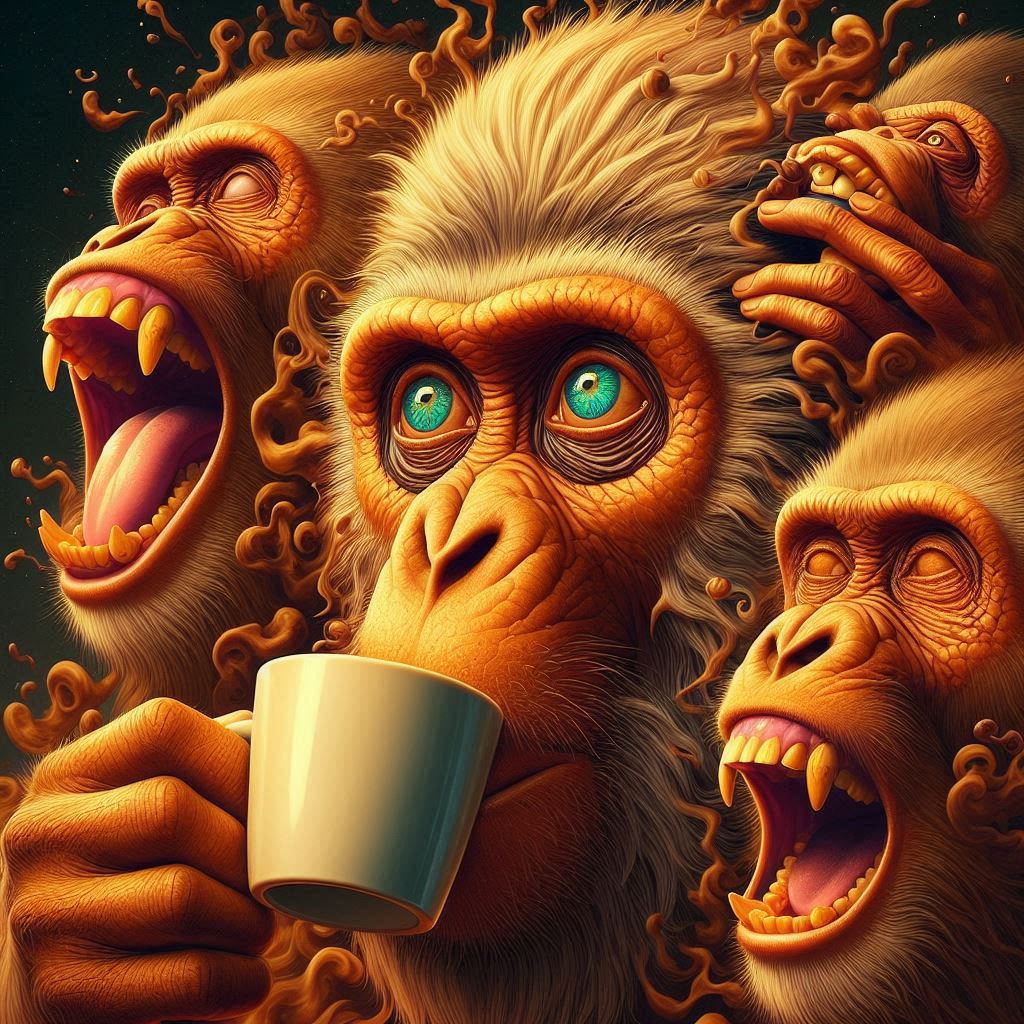
Can Monkeys Drink Coffee? Strange Human Foods Monkeys Have Tried
Share
Can Monkeys Drink Coffee? Strange Human Foods Monkeys Have Tried
Monkeys are curious, clever creatures with a remarkable ability to adapt to their environments. While their natural diet mainly consists of fruits, nuts, insects, and leaves, these primates aren’t above sampling some strange human foods. Over time, humans have witnessed monkeys trying everything from sugary treats to caffeinated beverages. But just how safe and normal is it for monkeys to indulge in human food, and can they even drink coffee?
In this blog post, we’ll explore some of the most bizarre human foods monkeys have tried, with a special focus on whether monkeys can drink coffee and how these foods affect their health.
1. Can Monkeys Drink Coffee?
Coffee is one of the most popular beverages worldwide, but does it belong in a monkey’s diet? While monkeys don’t naturally seek out coffee, there have been cases where monkeys have ingested coffee, either accidentally or out of curiosity. Some monkeys have been seen stealing coffee cups or nibbling on discarded coffee grounds, but is it safe for them to consume?
The short answer is no — coffee is not suitable for monkeys. Just like with humans, caffeine can have harmful effects on monkeys. It is a stimulant that can cause restlessness, increased heart rate, and even digestive issues. Since monkeys are much smaller than humans, even a small amount of coffee can have an exaggerated effect on their health.
2. Monkeys and Chocolate: A Deadly Combination
One of the most well-known dangers to monkeys is chocolate. While chocolate is a delicious treat for humans, it’s toxic to many animals, including monkeys. Chocolate contains theobromine, a compound that can be fatal if ingested in large amounts.
Monkeys in the wild rarely encounter chocolate, but when living in close proximity to humans, they may be tempted by chocolate bars or other sweets. Pet owners and sanctuaries must be especially cautious to ensure that their monkeys do not have access to chocolate products.
3. Monkeys Trying Sugary Snacks
Monkeys are not immune to the allure of sugary snacks. In fact, many monkey species are drawn to sweet foods. Whether it’s candy, cake, or soda, monkeys have been spotted trying a variety of sugary human treats.
While a little sugar isn’t necessarily harmful to monkeys in moderation, frequent consumption can lead to obesity and other health problems, much like in humans. Monkeys are also not equipped to digest sugar in the same way humans do, which can lead to an upset stomach or digestive issues.
4. Fried Foods: A Greasy Temptation
Fried foods are another human food that monkeys seem to enjoy, especially in urban areas where they may find leftovers. French fries, fried chicken, and other deep-fried snacks are often thrown away or left unattended in public spaces. Monkeys, ever the opportunists, will sometimes scavenge these greasy, high-fat foods.
While these foods may be enticing due to their texture and taste, they are not ideal for a monkey’s health. Fried foods are high in fat and calories, and regular consumption can lead to weight gain, diabetes, and other health issues.
5. Dairy Products: Do Monkeys Like Milk?
Milk is another food item that may attract a monkey’s attention, especially if they are exposed to it in human homes or on farms. Monkeys, like humans, can drink milk, but they often lack the necessary enzymes to properly digest lactose, the sugar found in milk.
While some monkeys may drink small amounts of milk without issue, most will experience gastrointestinal distress, including diarrhea, if they consume too much. As a result, it’s best to avoid offering milk or dairy products to monkeys, especially those in captivity.
6. Monkeys and Fast Food: An Urban Feast
In urban areas, monkeys often interact with humans and may come into contact with fast food. It’s not uncommon for monkeys to steal food from street vendors or tourists, particularly items like burgers, fries, and chips. These high-calorie, processed foods are not designed for a monkey’s digestive system and can lead to health complications over time.
For example, monkeys in some regions have been observed rummaging through trash cans for leftover fast food, and some urban monkeys may even beg for food from humans in parks and tourist hotspots. While these foods might give them a quick source of calories, they are not nutritious and can contribute to poor health.
7. Spicy Foods: A Hot Mess for Monkeys
Spicy foods are another human indulgence that can be tempting for monkeys, especially if they encounter them in trash or on picnic tables. Spices such as chili, hot sauces, and other spicy condiments can be dangerous for monkeys, as they are not accustomed to such strong flavors.
Spicy foods can cause severe stomach upset, irritation, and pain in monkeys, leading to discomfort or even more severe digestive issues. It’s essential to keep spicy foods away from monkeys and avoid feeding them foods that might cause harm.
8. Alcohol: A Dangerous Beverage for Monkeys
Though it’s rare, some monkeys have been known to consume alcohol, whether it’s from fermented fruits or human leftovers. However, alcohol is highly toxic to monkeys. Like humans, alcohol can impair motor function, cause disorientation, and be deadly in large quantities.
Monkeys in the wild sometimes come across fermented fruit, which naturally contains alcohol. This can lead to drunken behavior, but it’s dangerous for them and can negatively impact their health. Captive monkeys should never be given alcohol, as it can lead to long-term harm.
9. The Dangers of Human Food for Monkeys
While monkeys are incredibly curious and may sample human food, it’s important to remember that their natural diet is far different from what we eat. Giving monkeys human food can have serious consequences for their health. Foods that are high in fat, sugar, or salt can contribute to obesity, diabetes, and heart disease. Additionally, some foods are toxic to monkeys and can be deadly.
In conservation efforts and sanctuaries, caretakers work hard to provide monkeys with a proper diet that mimics what they would eat in the wild. Offering them human food only disturbs their natural habits and can lead to long-term health issues.
Conclusion
Monkeys are naturally curious, and their love for trying new foods is no surprise. However, human foods like coffee, chocolate, and fried snacks are not suitable for their diets and can cause harm. While it might seem cute when a monkey steals a piece of cake or tries a sip of coffee, it’s important to remember that these foods are not part of their natural diet and should be avoided.
As we continue to learn more about monkeys’ behaviors and diet, it’s crucial to respect their natural food sources and keep human treats out of their reach.
Want to learn more about animal behaviors and fun facts? Check out:
